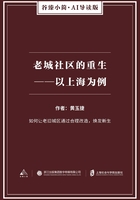First,though some classical economists discussed the division of land,they did not analyze it in a general equilibrium framework(see section A of this chapter).Since Marshall,the possibility of the landlord's allocating his total holdings to several tenants has been ignored(see section B of this chapter).While this is valid in analyzing an excise tax,under share tenancy the cost of land and the distribution of land are thereby neglected.Second,the percentage share has usually been taken as given.Under share tenancy,however,the rental percentage is a discretionary variable.Third,with a tax,the government is not contracting to maximize wealth.In other words,the tax-equivalent analysis fails to offer any explicit treatment of the terms in a share contract which the participating parties must mutually agree to abide by when the contract is formed.
We cannot analyze the way a person uses resources without first specifying the nature of his property rights.It is true that once the land size and the rental percentage are under contract to a tenant he prefers to work or invest less in land than if he cultivates his own land.But under private ownership of land,the landlord's incentive to maximize his wealth is not reduced.We may well repeat a conclusion reached in the last chapter:It does not matter whether the landowner stipulates that the tenant is to invest more in land and charges a lower rental percentage or whether the landowner invests in land himself and charges the tenant a higher rental percentage;the investment will be made if it leads to a higher rental annuity.
Yet,it would be misleading to say that all earlier analysts of sharecropping were deceived by the tax-equivalent approach and invariably arrived at the conclusion of inefficient resource use.Some did so,some expressed doubt,and some seem to have abandoned the tax approach altogether.Indeed,a survey of the literature on the subject reveals that at times even their errors are most interesting and their insights are sometimes most pro-found.[2]
A.The Classical View
Noting that sharecroppers"have been so long in disuse in Eng-land that at present I know no English name for them,"Adam Smith wrote of the metayers(sharecroppers)in France,which he believed were successors of"the slave cultivators of ancient times."[3] Of the productive nature of the metayage system,Smith wrote:
It could never,however,be the interest[of the metayers]to lay out,in the further improvement of the land,any part of the little stock which they might have saved from their own share of the produce,because the lord,who laid out nothing,was to get one-half of whatever it produced.The tithe,which is but a tenth of the produce,is found to be a very great hindrance to improvement.A tax,therefore,which amounted to one-half,must have been an effectual bar to it.[4]
Although the analogy to a tax which Smith drew might have led succeeding writers astray,the context in which he placed the discussion of the metayers is also significant.Smith did not focus on the metayage system itself;rather,in one full chapter he attempted to trace the development of land tenure arrangements with economic interpretations.[5]
According to Smith's view,the"slave"cultivators preceding the metayers were even less productive,because"a person who can acquire no property,can have no other interest but to eat as much,and to labor as little as possible."[6] Thus for more productive land use the metayers succeeded the"slaves."Since in his view the metayage system was also defective,Smith claimed that"by very slow degrees,"the metayers were succeeded by"farmers……,who cultivated the land with their own stock,
paying a rent certain to the landlord."[7] Although Smith favored fixed-rent contracts(farmers)over sharecropping,he was nonetheless concerned with the"insecurity"of the farmers because of expiration of the lease:"The possession even of such farmers,however,was long extremely precarious,and still is so in many parts of Europe."[8] He advocated"the law which secures the longest leases against successors of every kind,"but such a law was,to his knowledge,"peculiar to Great Britain."[9] In Smith's view,therefore,the British leasing arrangement-a freehold with a fixed rent and a lease for life-was more highly developed than those in other parts of Europe.[10]
Although the meaning of economic efficiency was not clarified until much later,Smith's idea of analyzing the development of land tenure systems on grounds of more gainful resource use is certainly an important one;however,the approach he used is not deep enough to yield fruitful results.Once property laws define a specific set of constraints on competition,there may exist several forms of contractual arrangements which imply the same resource use.(Why different contracts are chosen will be discussed in the next chapter.)When these property laws are altered,the contractual arrangements may change.It follows that the appropriate approach in analyzing land tenure development is to trace the alterations in property laws;and not,as Smith did,to interpret(or advocate)the change in laws by tracing what might appear to be defective leasing arrangements.















